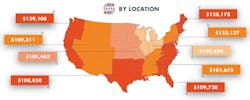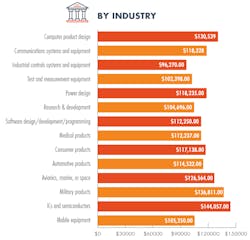Part 3: Engineering Salaries Grow Almost 10 Percent Over Last Year
Although many electrical and electronics engineers that responded to Electronic Design’s latest reader survey are unable to shake the feeling that they could make more money in another profession without the stressful conditions and punishing workload, two-thirds of respondents actually feel that they are adequately compensated for what they do.
The average pay in electrical engineering is looking up, according to the latest results from Electronic Design’s Salary Survey. Base salaries have increased from $105,040 to $113,624 over the last year, while many respondents are also collecting more money from bonuses and stock compensation. More than 37% of respondents feel that their wages are comparable to what other engineering employers are paying.
Many companies have also expanded other forms of compensation amid stable economic growth and the Trump administration’s move to curtail corporate taxes. Bonuses were $4,492 on average. Stock compensation came out to $2,764 on average, though more than two-thirds reported that they earned less than $1,000 through stock redemption. In addition, around 17% were rewarded with company shares, an increase of 3% from last year’s survey.
Some survey respondents also report that companies are improving access to healthcare, handing out hiring bonuses, covering continuous education costs, and offering other incentives to fill open engineering positions amid mounting competition for talent and growing turnover. The number of respondents that benefit from profit sharing has grown from 21% to 25% over the last half decade. One-third say that their employers offer signing bonuses.
Despite this, more than one-third of respondents feel that they should be better compensated considering the talent required for most engineering jobs. Around 31% say that their compensation packages are somewhat less competitive than what others receive, while 13% say that theirs are much less competitive. Another 13% say that they are compensated somewhat more competitively than others.
The battle for engineering talent is heating up. That may be boosting compensation in the short term. Around 67%of those surveyed say a headhunter has contacted them within the last year. while the companies of another 59% are having trouble finding qualified candidates for open engineering positions. Approximately 40% say that their company is going to hire more engineers over the next year, while 50% say staffing will largely stay the same.
At the same time, almost two-thirds of respondents are seeing their pay rise. Their compensation has increased 4% on average over the last year, twice the estimated 2018 inflation rate. But compensation is affected by many factors, including title, education, experience, location and an employer’s financial performance. Many respondents advise younger engineers to shift into management roles over time to move forward in terms of wage growth.
Design engineering positions pay $123,159 on average, including stock payments and bonuses, an increase from $99,880 over the last five years. Compensation for employees in engineering management roles grew from $130,314 to $137,644 since 2014. Executives have the highest salaries, bonuses, and stock rewards, with total compensation of $143,101, up from $128,906 over the same five-year period.
An employer’s earnings also affect compensation. Respondents working at companies that earn between $5 million and $999 million in revenue per year take home $115,616 on average. On the other hand, respondents employed by large corporations that report more than $1 billion of sales every year are earning an average of $139,608. Companies with less than $5 million pay their employees an average of $97,291, respondents say.
Working for either a private or public company can also influence overall pay. The average salary for respondents working at public companies was $122,984 with $5,179 in bonuses and $3,226 in stock, while the numbers for private company employees—more than 50% of those taking Electronic Design’s survey—came out to $110,548, $4,258, and $2,535, respectively. Electrical engineers working in education generally get paid much less.
Even though almost 30% of respondents say that they would consider leaving the engineering profession in order to make more money, most remain in high spirits. Nearly 90% say they are satisfied with what they do for a living. Only the challenges that accompany building new products and researching potential design solutions are more important to average respondent's job satisfaction than their pay.




